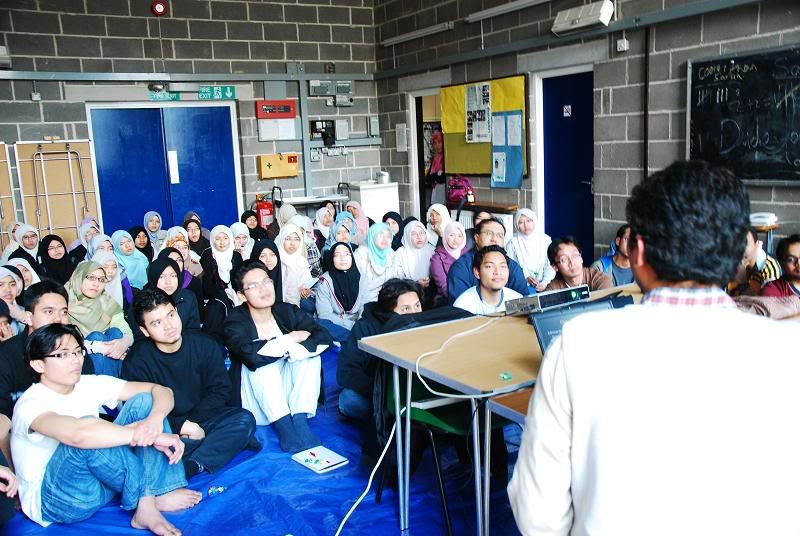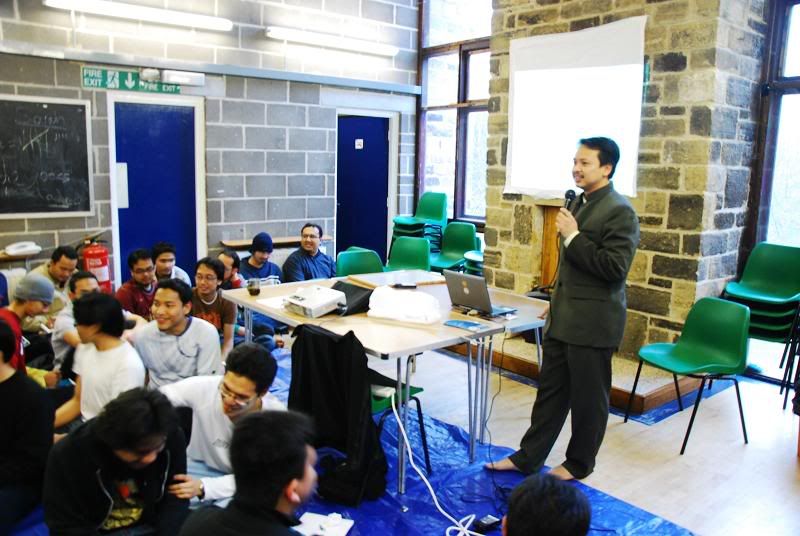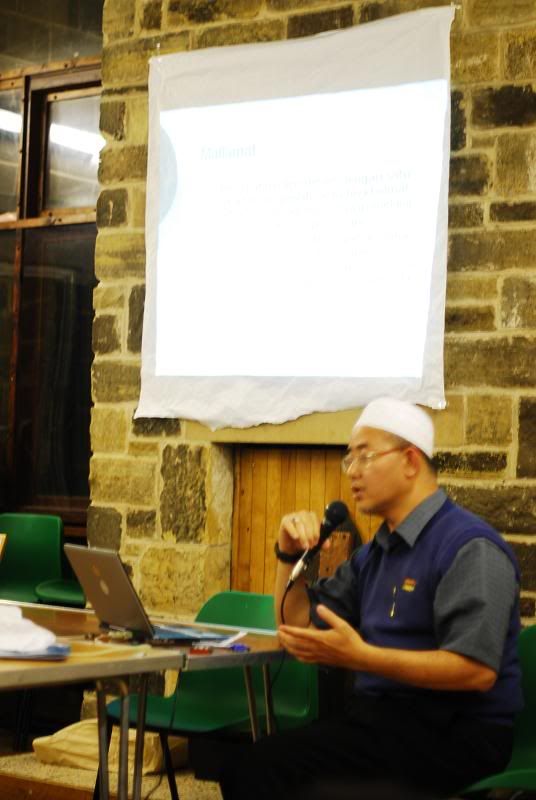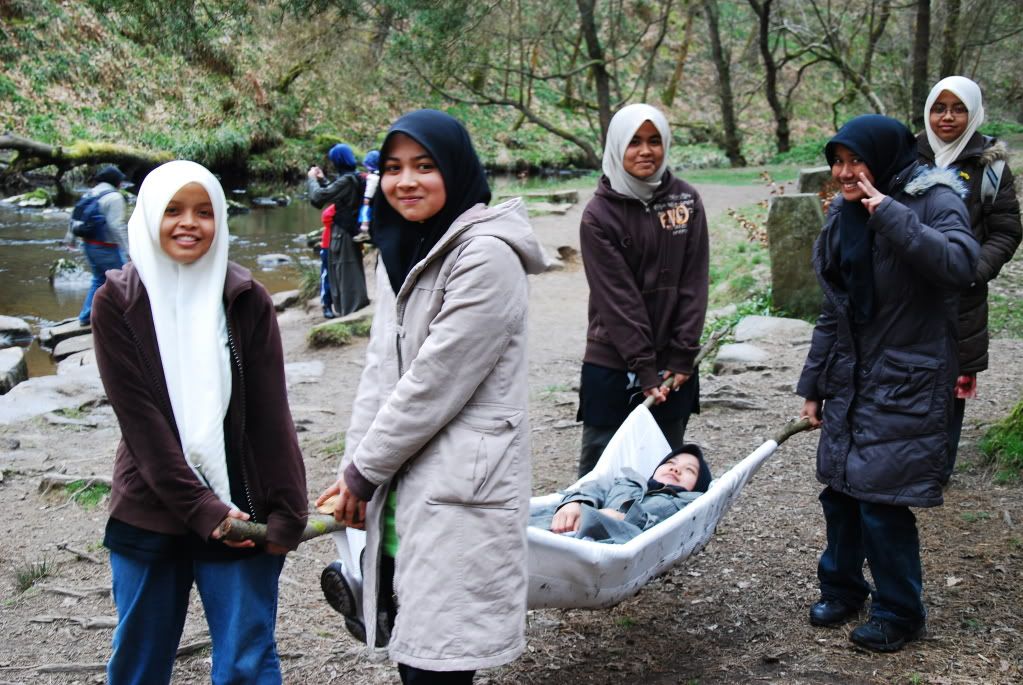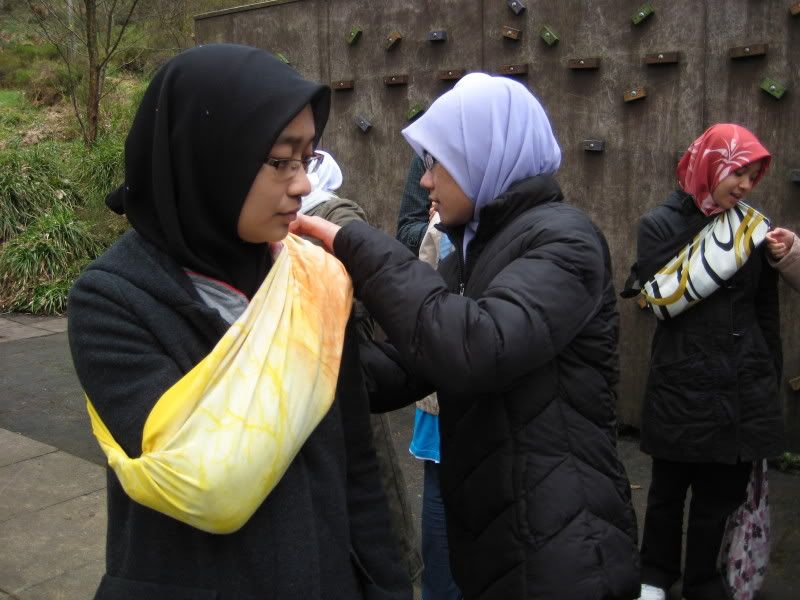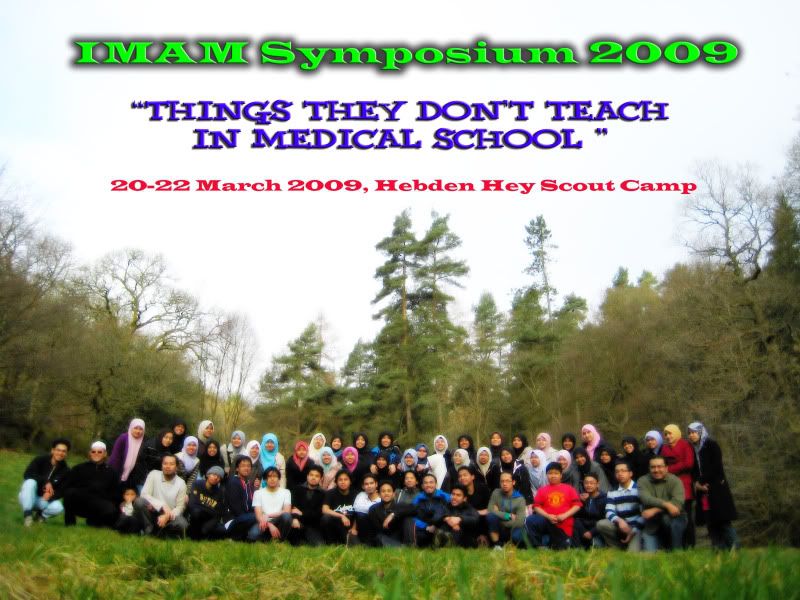Assalamualaikum wbt...
IMAM SYMPOSIUM 2009- Report and Sharing
Date: 20th-22nd March 2009
Venue: Hebden Hey Scout Centre, West Yorkshire
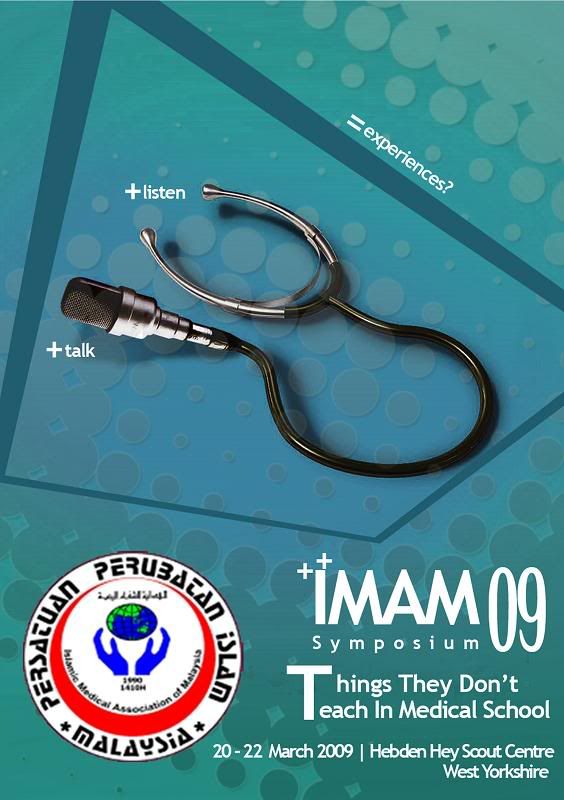
It is not every day that Malaysian Medical students, coming from all over UK and Ireland can get together in one big occasion. And when the opportunity came last weekend, in IMAM Symposium 2009, it was a great and memorable moment for many of us.
It was a weekend full of excitement, of new discoveries, and of wonderful ukhuwah. =)
This year, IMAM Symposium ‘09 offered a different experience for the participants, as we were all gathered in a camp-style symposium, surrounded by the beauty of nature and the relaxing scenery of Hebden Hey Scout Centre, West Yorkshire. With the soothing sound of river flowing, and with the company of our sisters/brothers in Islam, we would not want to be anywhere else but here this weekend!
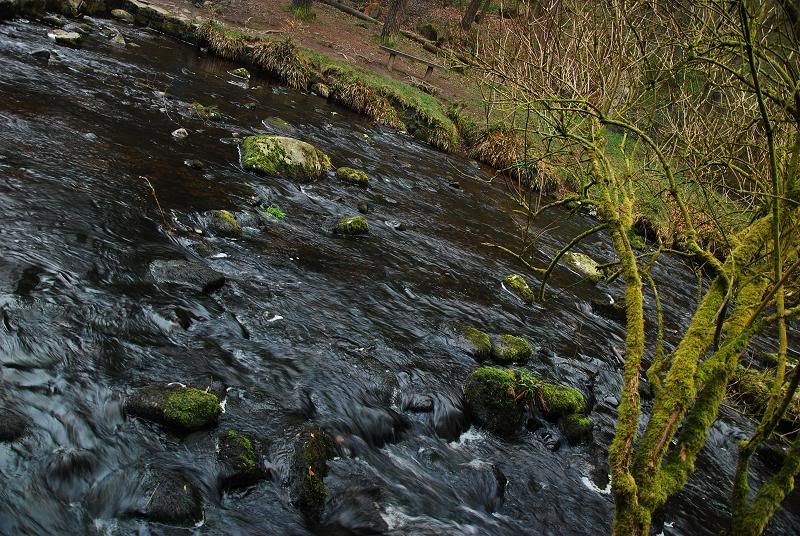
With the theme "Things That They Don't Teach In Medical School", 80 participants (including medical students, doctors and even some non-medic students) explored many things that we know we could never find anywhere else, not in any textbook, not in any medical schools.
Although it would be almost impossible to jot down every single thing that we have gained in these few days, but hopefully we will be able to share some highlights of the events in this report.
Saturday (21 March 2009)
Tai Chi With the Master (Shamshir)
The morning kick-started with an exercise by the TaiChi Master, Shamshir, with the 'ball of energy'. Definitely a great start for the morning, to stretch our legs and to relax our body.
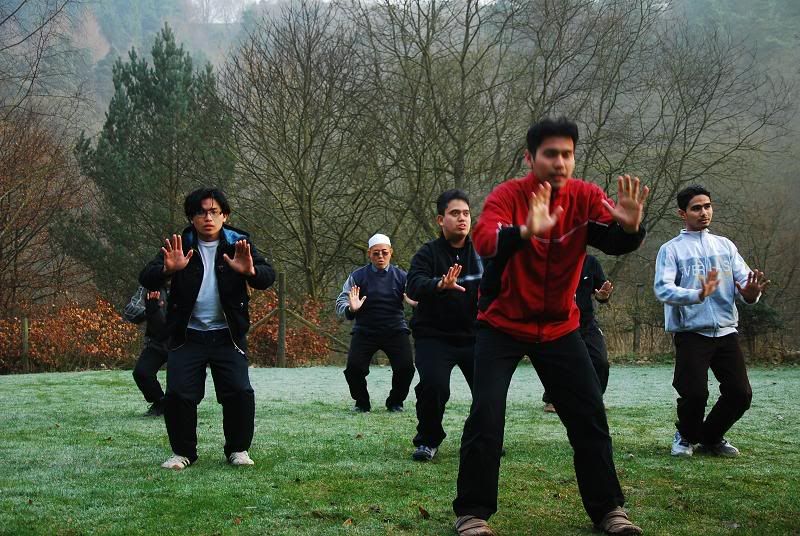
Jungle Tracking
It was a beautiful morning with the sun rising in the horizon, and jungle tracking was the perfect way to enjoy the morning. We passed along streams, jumped from one rock to another to reach to the other side of the stream, and stopped every few minutes to answer questions from 6 checkpoints.
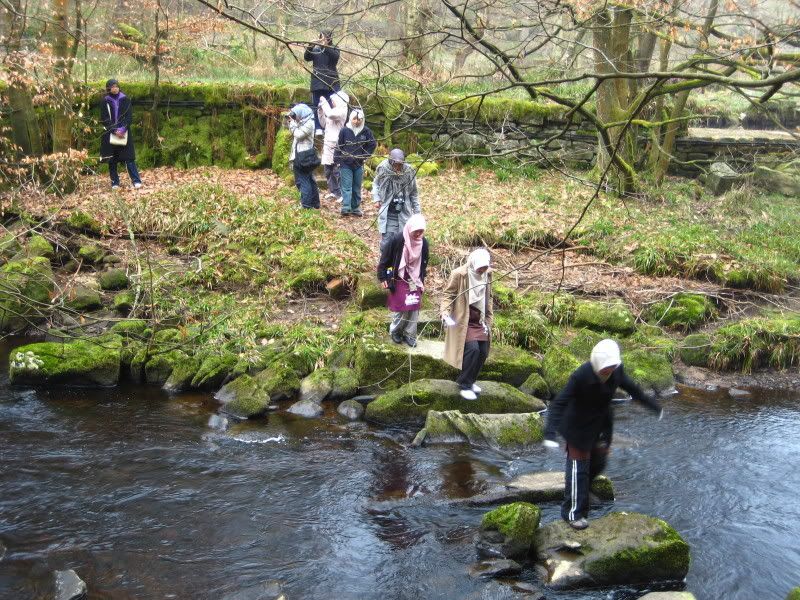
Checkpoints included :
-Quiz on arterial blood supply ( take home message: yes, we need to brush up on our anatomical knowledge!),
-Consent and confidentiality station (Discussion on scenarios for example: Would you or would you not break the news to the wife of a HIV patient that her husband is HIV positive?),
-Simulation of a GP visit scenario (E.g. Patient presents with pain in right leg when walking, please take history from her, and what do you think the diagnosis is?),
-Pathological Word Game (say the disease is hepatitiS, the next person will try to think of a disease which starts with the letter S),
-Peripheral Pulse checkpoint,
-Guess a disease based on its symptom and descriptions.
It was a good walk, a good exercise for the body as well as for the brain cells. =)
Talk on Wound Management and Basic Surgical Techniques- By Dr Alhady Alfian
A talk that introduced the importance of wound management, the different types of wounds, and also suturing technique.
Suturing Practicals: Who Is The Best Surgeon?
And then, it’s time to practice our own skill in suturing. So, who is the best surgeon?
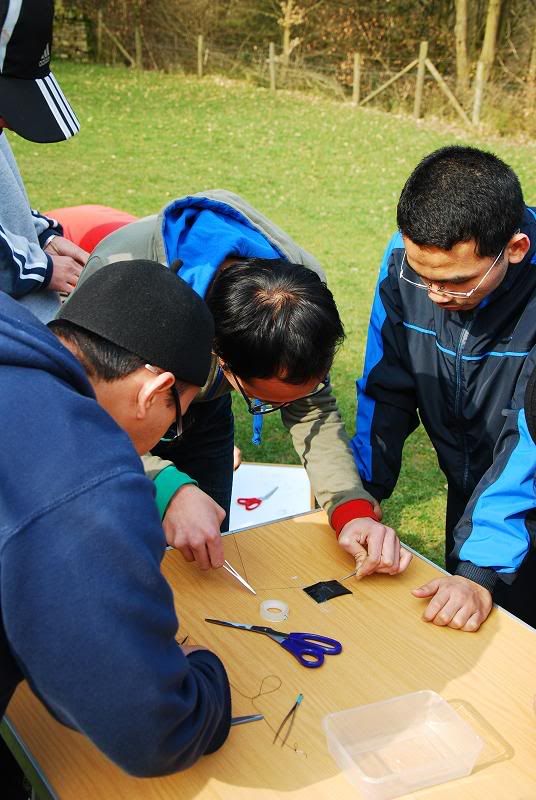
Islam and Medicine: 2 Different Worlds?
A few real-life case scenarios were presented by Dr Alhady Alfian (Specialist Registrar Emergency and Intensive Care Medicine) , and we were made to think of the diagnosis, and management of these patients.
The issue of death and its definition, be it in the medical term or Islamically were discussed, as well as other issues such as organ donation, euthanasia and others. “What happens to the body of the deceased if he dies in this country? Is he allowed to donate his organ after his death? But who really ‘owns’ the body?” Alhamdulillah, many of our questions were answered in this session.
It is interesting to note that the western definition of Mental Health consists of “Bio-Psycho-Social”,but in Islam, we extend it a bit further to “Bio-Psycho-Social- Heart-Divine”.
Undoubtedly, to be an excellent doctor, years of medical training are required for us to progress to the next level. From a Foundation Year doctor, to a ‘HO’ to ‘SHO’ to a Consultant (in the UK). No one would want to remain stagnant without moving forward. And yes, the same applies to our Islamic knowledge and tarbiyah. To be an excellent Muslim, we need to increase our Islamic tarbiyah as we progress in time. And that is through various ways such as to be involved in usrah, quranic reading, hadith , teaching others what we know, doing dakwah, and so much more.
PBL Fiqh Ibadah Pesakit
Another enlightening talk by another great speaker, Ustaz Erfino Johari on Fiqh Awlawiyat based on the writings of Yusuf Al-Qardhawi. We then discussed a few case scenarios that we may encounter in our daily lives as medical students/ medical practitioners.
“What should be the stand of a Muslim girl wearing a hijab, to the infection control policy of wearing half sleeves in the ward to prevent infection? How would a patient with urinary incontinence, do his ablution and prayer? Can we donate our body to be dissected by medical students after we died?”
Alhamdulillah, Ustaz Erfino guided us to answer many of these questions. It was a very interesting and useful discussion as we medical students and practitioners will inevitably face these kinds of situations in our career.
A Doctor’s Diary: Medical Profession as an Ibadah by Prof. Amaluddin Ahmad
“How would you, as a medical practitioner, turn your everyday profession as a doctor into a form of ibadah? Are doctors and daie’s, two different entities or are they the same?” This talk opened up our eyes to the reality of the huge responsibilities that we bear, not only to the patients that we treat, but also to the community as a whole. We are very grateful that Prof Amaluddin Ahmad, coming all the way from Malaysia would share his insights on this topic.
Believe it or not, doctors have so much ‘power’ in our hands. We have high access to the humanity; people put such high trust on us, and therefore this should be utilized fully to reach the ultimate objective of dakwah. Through this understanding, IMAM emerged to pave the way for Muslim medical community to work as one, reaching for the same aim and to build networking. It has so far been an influential tool to spread dakwah to the community, be it dakwah through character, words or good deeds.
Many were inspired as Prof Amal continued to explain to us about the An-Nur Medical City Project by IMAM doctors/MIG. Some of us could not believe that we Malay Muslims are able to think or dream of such enormous project that could benefit the humanity. We admire the visions that our doctors uphold and their strong determination to see Muslims rise again to lead the world. And let us find home and a sense of belonging in this wonderful project, as we are the next generation who will inherit it and make it a reality!
And as Prof Amal rightly said, with a clear vision in our minds, nothing will ever be impossible; and if Allah wants it to happen, it will succeed no matter what. Allah works in magical ways, and as believers, we should strive our very best, and make a lot of doa as it is definitely the key of success.
The ummah is waiting for us to bring Islam back to where it truly belongs. So, let us be leaders with high aspiration, who produce high-quality work. Let’s organize ourselves and work collectively to reach the same vision. Don’t be afraid to dream, make careful plans and strategies, strive for knowledge, tarbiyah & training, and materialise them through our practice (amalan).
“You are the best of the nations raised up for (the benefit of) men; you enjoin what is right and forbid the wrong and believe in Allah..” 3:110
“The ummah is like 100 camels,you can only find one which can withstand a very long journey and succeed.”
So let us be the one!
And our aim is not just to build yet another hospital, or another university; but we strive to uphold the religion and the ummah, and work to build our Islamic civilization once again, insyaAllah.
Career Chit-Chat
We were divided into groups and doctors shared their
experiences to a smaller-scale audience. It was an interactive session, as students asked their respective doctor on the career pathway and general tips in preparation for the coming challenging years as a doctor.
Sunday, 22nd March 2009
Activity: Extreme medicine
In this activity, participants were divided into 4 stations, each with an extreme medical case.
Station 1
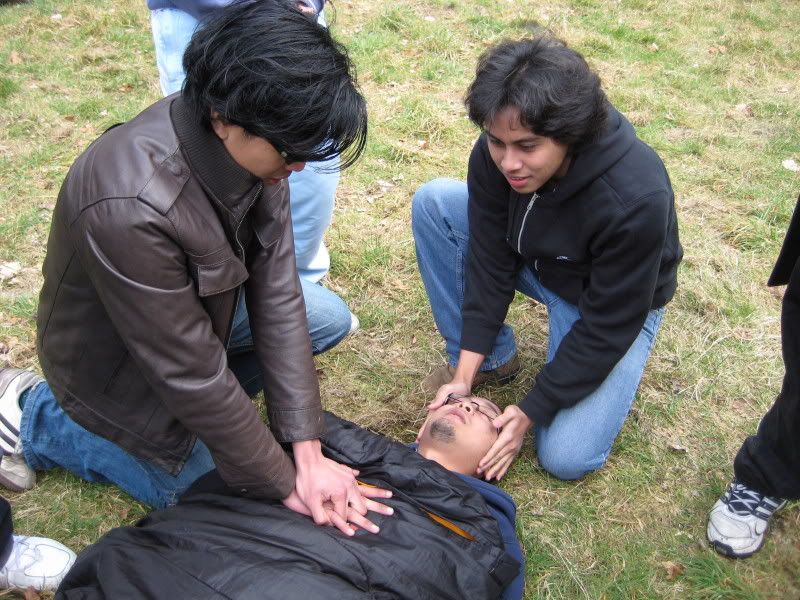
Situation: a person was found unconscious in a cold lake
Objective: Discuss about hypothermia and how to handle a hypothermic patient in extreme conditions
Participants were asked to dip their hands in the cold river (at the campsite) for 30 seconds just to have a feel of what it’s like to be in cold water for sometime. Most of the participants knew straight away that the station was about hypothermia. The facilitators then guided the participants in understanding hypothermia and what to do if we come across a hypothermic person which in this case, is found unconscious in a cold lake.
The activity became more of a discussion since the facilitators were asking questions instead of giving information.
Station 2
Situation: a person in the team is injured and needs to be carried to the nearest medical facility
Objective: Learn how to make a stretcher using general camping equipments
Participants were given a blanket and two wooden logs and were taught on how to make an emergency stretcher from them. Alternatively, two jackets were used instead of a blanket.
It was interesting to watch how creative people can be when given limited resources to make something.
Station 3
Situation: a person in the team has an injury of the hand
Objective: Learn how to make an arm sling (for arm injuries) and an elevation sling (for forearm or collarbone injuries)
Participants were given a triangular cloth/scarf and were taught on how to make an arm sling from it.
Most of the participants acknowledged that this was a useful knowledge to learn especially during sports events where we usually participate as first aiders.
Station 4
Situation: a lot of people are injured in a tragedy and you need to prioritize patients based on the severity of their condition
Objective: Learn how to perform a triage in disasters involving a lot of casualties
Participants were asked to perform a triage by separating the injured into four categories:
- The deceased
- The injured that can be helped with immediate attention
- The injured whose attention can be delayed
- Those with minor injuries, who needs less attention
It was fun watching how confused the participants were in prioritizing which patients should be treated first. However, they find the knowledge useful since in extreme cases, the resources are limited and timing is essential.
All in all, everyone enjoyed the activity very much since it was done outdoors in which it was easier to have a feel of the so called ‘extreme situations’. Participants gave 100% commitment and were actively participating in the discussions and hands on stuffs.
A closing note
Alhamdulillah, with His blessings, we were able to organize IMAM Symposium 2009 this year. Our special thank you goes to our enthusiastic and devoted speakers, Prof Amal, Dr Alhady and Ustaz Erfino who had spent their precious time to be with us and to share with us their experiences and knowledge. Only Allah will be able to reward you; and may He grant you the highest of Jannah, insyaAllah. We’d also like to thank our advisors including Prof Abd Latiff, Dr Iqbal and Dr Azlisham and also other doctors who have helped us for the never-ending support for this event.
Also to all participants who have joined us in this programme, thank you. We hope that each of us has brought back home beautiful memories, new knowledge and pleasant experiences that will equip ourselves with the necessary values to become outstanding Muslims. Also thank you to all committee members who have made this programme a reality,jzkk.
And lastly, let this not be an end but let it mark a beginning to our contribution to Islam and the world. Remember to always keep the spirit alive and be sincere & steadfast in this journey to uphold Islam in the eyes of the world again. Think of ways to maximize our potential in ways that will benefit the ummah.
Let us become excellent Muslim doctors who will be the leaders of the world, insyaAllah.
And don’t forget to join IMAM activities near you! ;)
May Allah bless you, salam wbt.
Prepared by,
Mai Shahira Meor Hazizi / Atikah Latiff
Secretaries
IMAM SYMPOSIUM 2009
